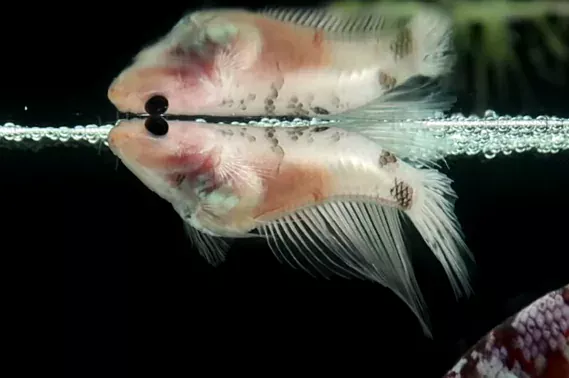If you’re new to the world of owning a Betta fish, congratulations on your new pet! If you’ve been a Betta owner for a while and are now wondering if your little finned friend is pregnant, congrats again: you’ve got an exciting journey ahead! But don’t worry if you’re feeling nervous or unsure. We’ll walk through the signs of pregnancy in Betta fish, what happens next (or doesn’t), and how to properly care for both momma Betta and her soon-to-be babies.
Source Of All Images: Bije Aquatics
- 1 Do Betta Fish Get Pregnant?
- 2 How Betta Fish Get Pregnant?
- 3 Ideal Water Parameters For Betta Fish Breeding
- 4 Pregnant Betta Fish Behavior: Signs And Symptoms
- 5 Pregnant Betta Fish Care Guide
- 6 How Long Does A Betta Fish Stay Pregnant With Eggs?
- 7 How Many Eggs Does A Female Betta Fish Lay?
- 8 What Do Betta Fish Eggs Look Like?
- 9 What Color Are Betta Fish Eggs?
- 10 How Eggs Are Fertilized By Male Betta Fish?
- 11 How To Tell If Betta Fish Eggs Are Fertilized Or Not?
- 12 Can Female Betta Fish Lay Eggs Without A Male?
- 13 What To Feed Your Pregnant Betta Fish?
- 14 Conclusion
Do Betta Fish Get Pregnant?
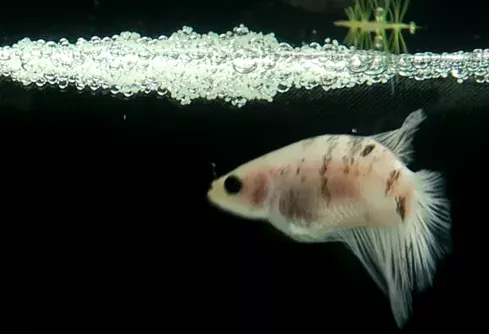
Yes, They do but not the way you think. Betta fish are oviparous animals, which means that they lay eggs instead of giving birth to live young. This is different from mammals and other vertebrates who give live birth to their offspring. The female betta fish does not become pregnant in the way we think about it: she doesn’t carry a baby in her body for nine months before birthing it.
How Betta Fish Get Pregnant?
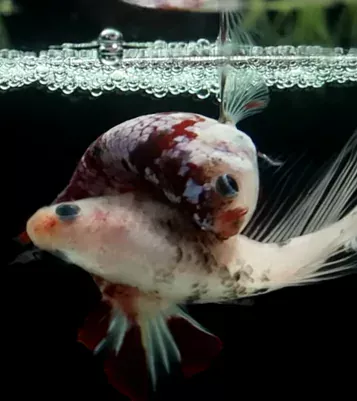
Rather, the male and female engage in mating behavior until eggs are formed inside of the female’s ovaries (which we believe to be the pregnancy stage), where they will mature until it’s ready to be laid by the mother. A male betta fish then fertilizes the eggs, then becomes a father to his offspring.
Ideal Water Parameters For Betta Fish Breeding
The ideal water parameters for breeding Betta are:
Temperature: 78 – 82 degrees Fahrenheit
pH Level: 6.5 to 7.5
Filter: use a sponge filter or something similar; not an internal canister filter. These don’t circulate the water enough, which can lead to dead fry (babies) if you’re using bubble nests and breeding nets with your male and female betta fish!
While there are many factors that go into the successful breeding of bettas, these are some of the most important aspects of keeping healthy betta fish.
Pregnant Betta Fish Behavior: Signs And Symptoms
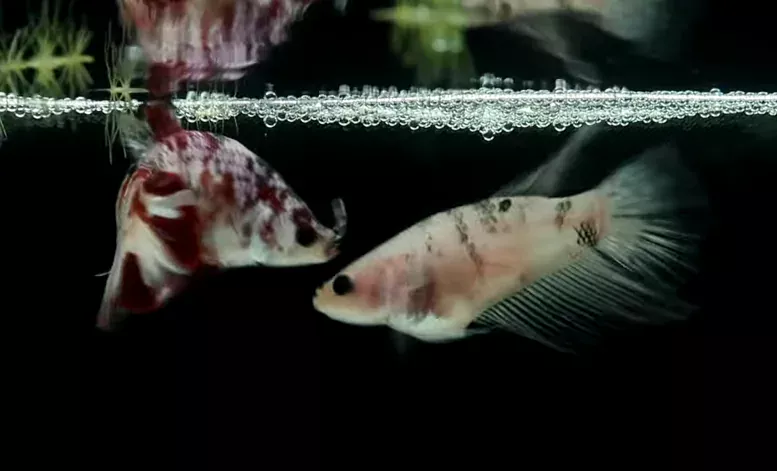
Here are 6 key indicators that your female Betta is getting ready to become a mommy:
1- Swollen Belly
There are several signs you can look out for to determine whether or not your betta fish is pregnant. One of the most obvious signs is that the fish has a swollen belly, which will be filled with eggs. The belly will also get larger as she gets closer to giving birth and she’ll likely be eating more than usual, as well as being less active than usual.
2- Shyness And Hiding Behavior
If your female betta fish is acting very shy and hiding, it’s a sign that she might be pregnant. The female betta fish will usually hide in the darkest corner of her tank during the last few weeks of pregnancy. This may make it difficult to observe changes in her body or look at her fins. Another sign that your betta fish might be pregnant is an increase in aggression towards other fish in the tank, even if they are normally non-aggressive with each other. It’s important for you to check for these signs so you can provide proper care for your pregnant pet!
3- Loss Of Color Or Fading
If the color of your betta fish is fading or becoming pale, it’s possible that she is pregnant. As a female betta fish gets ready to give birth, her body will begin to produce hormones that cause her to stop eating and lose interest in food. Also, as she prepares for the birthing process, she will become less active. This can result in a duller appearance of your female betta fish which may appear very pale or even transparent!
4- Anal Fin Becomes Longer And Pointer
One of the most obvious signs of a pregnant betta fish is that its anal fin becomes longer and pointier. The anal fin is located on the side of the betta fish, and it’s usually short, but during pregnancy, it can become longer and pointier.
5- Change In Behavior, Usually Towards Aggression
A pregnant female betta will become more territorial and defensive. She may also attack her tank mates if they’re male, so be careful if you want to keep both males and females in the same tank (though it’s best not to mix the two). If she attacks one of her tankmates, she may end up killing them.
6- Wider Fins and Clamped Fins
A betta fish’s fins will grow wider during pregnancy. You might also see some clamped fins, in which the fins are folded against the body and won’t open under normal circumstances. When this happens, remember that it could be a sign of an infection or other health problem instead of pregnancy.
Pregnant Betta Fish Care Guide
If you have a pregnant Betta fish, congratulations! It’s important to provide her with the right environment during her pregnancy and after she has given birth. Below are a few tips for you:
1- Separate The Female Betta Fish
Once you know your fish is pregnant, it’s time to separate the female from your male betta fish. If you don’t do this, she will lay her eggs in her tank and they’ll never hatch. This is because male bettas tend to be aggressive, and they will eat any eggs that are laid by their female counterpart.
2- High Quality Diet
To keep your pregnant betta fish happy and healthy, you need to feed her high-protein foods. If you can find it, try adding some bloodworms or brine shrimp to her diet. These are both excellent sources of protein that will help her grow a healthy batch of fry (baby fish).
If you don’t have access to these foods or if they’re out of season, don’t worry! You can go ahead and feed your pregnant betta fish smaller meals throughout the day instead of one large meal at night. As long as she’s still getting enough food every day, she’ll be fine!
Just make sure not to overfeed her—this isn’t something any fish should do (and definitely not something pregnant ones should do). Give her just enough food so that she finishes most of it within 30 minutes; if there are still leftovers after an hour has passed since she finished eating, take those away from her before they spoil in the bowl. The last thing we want is for our poor little mommy-to-be here to get sick because we gave too much at once!
3- Add Heater
The temperature of the water is important to keep your pregnant betta fish happy and healthy. The proper temperature will ensure that she can give birth to healthy fry.
The ideal tank temperature for your pregnant betta fish is around 80 degrees Fahrenheit (26 degrees Celsius). You may need to use a heater or cooler depending on where you live, but this should be the general rule of thumb if your tank isn’t heated by itself.
4- Keep The Water Clean
While it is not necessary to change the water in your fish tank, it is important to keep your betta’s home clean and aerated. This will help prevent disease and keep her comfortable. There are several ways you can do this:
- Use a filter on your aquarium, which will help remove excess waste from the water.
- Clean any decorations that have gotten dirty or clogged with hair or other debris. You can use a toothbrush soaked in vinegar or lemon juice to scrub these items clean if needed (make sure they are thoroughly rinsed afterward).
In addition, make sure that you don’t overfeed your fish; this could lead them to produce more waste than their tank can handle.[
5- Avoid changing The Water Before She Lays Eggs
As your betta fish is about to lay eggs, you may be tempted to change the water. This is not recommended. In fact, if you do this before the female has laid her eggs, she may not lay any at all. Many people ask why they should avoid changing the water in their tank when they notice their betta fish swimming around like crazy with a full belly. The reason for this behavior is that it’s time for them to spawn (lay eggs). So keep an eye out and make sure you don’t accidentally disturb her while she’s doing her thing!
6- Separate The Babies (If Possible)
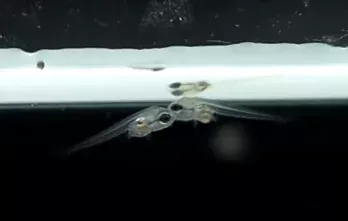
If you can, try to separate the babies from their mothers. This is best done when they are a few days older; if they are younger than three days, this may not be possible. Separating betta babies will give them enough space to grow and protect them from the aggression of other fish as well.
How Long Does A Betta Fish Stay Pregnant With Eggs?
So the next question you would be asking is how long a betta fish stays pregnant? The answer is, that it depends on the species, but generally speaking, most bettas will carry eggs for 1 or 2 weeks before they are ready to be fertilized by their male counterpart.
Once your betta lays her eggs, she’ll place them into a bubble nest where they will remain until they hatch. This can take anywhere from 24 – 36 hours depending on whether or not you want to induce hatching with an aquarium heater (which we don’t recommend). After about 48 – 72 hours, she can lay fresh batches of eggs every few days until she gives birth to all of her fries!
How Many Eggs Does A Female Betta Fish Lay?
When it comes to how many eggs a female betta fish can lay, the answer is again: It depends on different factors but in general, a female betta fish lays between 100-500 eggs.
The eggs are usually laid on the surface of the water and in clusters (one egg per cluster). which are then fertilized and protected by male betta fish.
What Do Betta Fish Eggs Look Like?

The eggs are oval and translucent, with a jelly-like texture. The egg itself is about 1mm in size, smaller than the head of a pin!
If I were to give you an example, Betta fish eggs look very similar to mosquito larvae or brine shrimp nauplii (baby brine shrimp). They are a pale white color and are transparent, so you can see right through them.
What Color Are Betta Fish Eggs?
The eggs are transparent white balls. As they grow, you will see dark flecks of color on the inside of the egg. The flecks represent blood vessels that are developing in order to supply nutrients to the developing embryo. If you are looking at a fertilized egg, you might notice that these speckles will not appear in unfertilized eggs. This could be because there is no embryo forming inside unfertilized eggs.
How Eggs Are Fertilized By Male Betta Fish?
Unlike the female fish, male betta fish do not lay eggs. Instead, they fertilize the eggs of a female betta by releasing their sperm packet into the water. The sperm packet is released from the male’s anal fin and mixes with the water in which he lives. Once this happens, it can take anywhere between 2 to 3 days for eggs to hatch.
How To Tell If Betta Fish Eggs Are Fertilized Or Not?
You can tell if your betta fish eggs are fertilized or not by checking to see if they’re white. Unfertilized eggs will remain completely white, while fertilized ones will become fuzzy and stop growing.
Fertilized betta fish eggs also generate dark flecks of color, which is another clue that they’ve been successfully fertilized. These flecks may look like black dots on the egg’s surface, or they could appear as a dark ring around the embryo inside it.
Can Female Betta Fish Lay Eggs Without A Male?
Betta fish are a very unique species, as they can lay eggs without the presence of a male. This makes them very unique to other fish. Luckily for betta owners, this does not mean you will have to go out and buy yourself a male if you want your female betta to give birth. But keep in mind, you will need both sexes if you want your eggs to hatch into tadpoles and then adult bettas!
What To Feed Your Pregnant Betta Fish?
During pregnancy, it is important to stick with live foods like mosquito larvae and brine shrimp as well as frozen foods such as bloodworms, daphnia, and tubifex worms. When buying live foods for your pregnant Betta make sure they come from a reputable seller who sells healthy stock at all times of the year so there isn’t any risk of poor health due to fluctuating water temperatures or other factors outside their control.
Just as important as what kinds of food you feed your pregnant Betta is how much food you give her each time; giving too little can cause starvation while simultaneously giving too much could lead to overfeeding which causes bloating which could then result in death! You want just enough so that she doesn’t get sick but still stays healthy enough for those eggs we talked about earlier – don’t forget about those babies!
Conclusion
Most betta fish will eventually spawn. However, if you want to breed your bettas by hand and control their environment, you can create a nesting area with live plants. You’ll need a large aquarium so that the adults have enough space to raise their fry in peace.
If you’re patient and committed, raising them isn’t hard and it can be incredibly rewarding! Not only does all of that work help save the lives of these little guys, but it’s also lots of fun to watch them grow into gorgeous adults right before your eyes.

